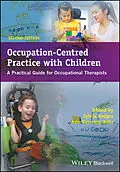Occupation-Centred Practice with Children remains the only occupational therapy book which supports the development and implementation of occupation-centred practice with children. Drawing on the latest occupational therapy theory and research, this new edition has been fully updated throughout, and includes new chapters on occupational transitions for children and young people, assessing children's occupations and participation, intervention within schools, the arts and children's occupational opportunities, as well as using animals to support children's occupational engagement.
Key features:
* Written by an international expert team of contributors.
* Each chapter begins with preliminary questions to assist with consideration of current knowledge, and then reflection questions at the conclusion to allow revision of key content in order to support independent learning.
* Highly practical, with a range of case studies, key point summaries, reflective questions, best practice guidelines, and a range of tools, interventions and techniques to aid applications to practice.
* A new appendix outlining all the assessments referred to in the book has now been included.
Occupation-Centred Practice with Children is a practical, theoretically grounded and evidence based guide to contemporary occupational therapy practice, and is important reading for all occupational therapy students and therapists wishing to make a real difference to children and their families' lives.
Autorentext
About the Editors
Sylvia Rodger AM, Emeritus Professor, University of Queensland, Australia and Director of Research and Education Cooperative Research Centre for Living with Autism (Autism CRC).
Ann Kennedy-Behr, Lecturer and Program Coordinator - Discipline of Occupational Therapy, School of Health and Sports Science, University of the Sunshine Coast, Australia.
Klappentext
Occupation-Centred Practice with Children remains the only occupational therapy book which supports the development and implementation of occupation-centred practice with children. Drawing on the latest occupational therapy theory and research, this new edition has been fully updated throughout, and includes new chapters on occupational transitions for children and young people, assessing children's occupations and participation, intervention within schools, the arts and children's occupational opportunities, as well as using animals to support children's occupational engagement.
Key features:
- Written by an international expert team of contributors.
- Each chapter begins with preliminary questions to assist with consideration of current knowledge and ends with reflection questions to allow revision of key content to support independent learning.
- Highly practical, with a range of case studies, key point summaries, reflective questions, best-practice guidelines and a range of tools, interventions and techniques to aid applications to practice.
- A new appendix outlining all the assessments referred to in the book.
Occupation-Centred Practice with Children is a practical, theoretically grounded and evidence-based guide to contemporary occupational therapy practice, and is important reading for all occupational therapy students and therapists wishing to make a real difference to children and their families' lives.
Inhalt
Notes on Contributors xi
Foreword xv
Preface xvii
Acknowledgements xix
1 Introduction to Occupation?]centred Practice for Children 1
Sylvia Rodger and Ann Kennedy?]Behr
Introduction 1
Re?]affirming occupation: The core of occupational therapy 5
External influences impacting occupational therapy practice 6
International Classification of Functioning, Disability and Health (ICF) 8
United Nations' declarations 9
The evolution of occupational therapy practice with children 11
Changing views of child development and maturation 11
Emerging views about occupational development 13
Re?]focusing occupational therapy with children 14
Conclusion 15
References 16
2 Becoming an Occupation?]centred Practitioner 21
Sylvia Rodger and Ann Kennedy?]Behr
Introduction 21
Theoretical underpinnings of occupational therapy with children 22
Occupation?]centred and performance?]component focused approaches to practice with children 23
Characteristics of occupation?]centred practice for children 28
Focus on occupational performance and participation throughout the process 30
Conclusion 39
References 40
3 Child and Family?]centred Service Provision 45
Sylvia Rodger and Deb Keen
Introduction 45
Defining the client: Who and how many? 46
Client?]centred practice 46
Child?]centred practice 48
Family?]centred practice and service provision 49
Family?]centred practice, family?]centred services and family?]centred care 51
Becoming a child?] and/or family?]centred practitioner 52
Developing family?]centred services 55
Outcomes of family?]centred practice and family?]centred services and their measurement 61
The extended family and community 64
Conclusion 65
References 66
4 Cultural Influences and Occupation-centred Practice with Children and Families 73
Alison Nelson, Chrisdell McLaren, Tara Lewis and Michael K. Iwama
Introduction 73
Culture and the occupations of the child 74
Culturally responsive occupational therapy 75
The child's and family's stories are central 76
Getting connected 77
Being connected 78
Staying connected 80
Building connections 82
Case studies 82
Making the invisible visible 88
Conclusion 88
References 89
5 Occupational Goal Setting with Children and Families 91
Nancy Pollock, Cheryl Missiuna and Judy Jones
Introduction 91
Giving children and families a voice 92
Goal setting and motivation 93
Goal setting and outcomes 94
Tools to facilitate goal setting with children and families 94
Summary 102
Goal setting contributes to outcome measurement 102
Case studies: Goal setting with children and parents 103
Conclusion 106
References 106
6 Occupational Transitions for Children and Young People 111
Sok Mui Lim and Fiona Jones
Introduction 111
Definition of transition using a life course perspective 112
Transition from home to early childcare centres 112
Transition from early childhood care to primary school 116
School readiness 118
Transition to secondary school 121
Tips for transition to secondary school 125
Transition to post?]school options 127
Conclusion 129
References 129
7 Assessing Children's Occupations and Participation 133
Chi?]Wen Chien and Ted Brown
Introduction 133
Bottom?]up or top?]down approaches to assessment? 135
Occupation?] and Participation?]Centred Assessment with Children (OP?]CAC) framework 137
Implementation of Occupation?] and Participation?]Centred Assessment with Children (OP?]CAC) framework: Assessment in action 138
Occupation?] and Participation?]Centred Assessment with Children (OP?]CAC) framework: Tools 141
Conclusion 159
References 159
8 Cognitive Orientation for Daily Occupational Performance (CO?]OP): An Occupation?]centred Intervention 165
Sylvia Rodger and Helene Polatajko
Introduction 165
CO?]OP: A brief overview 166
CO?]OP Approach: An occup…
